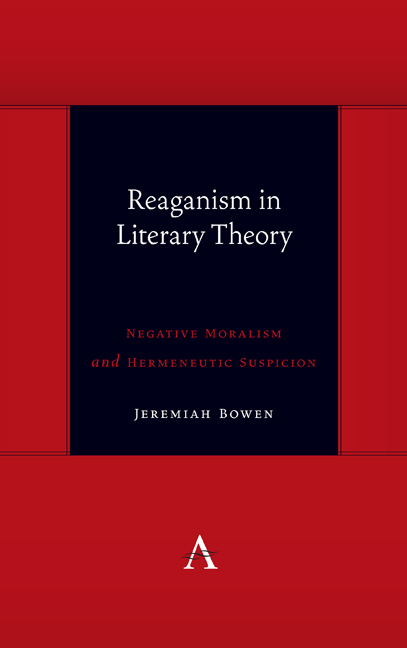Book contents
- Frontmatter
- Contents
- Acknowledgments
- Essay One Interpretive Politics: Reading Systemic Oppressions with Eve Sedgwick, Stephen Best and Sharon Marcus
- Essay Two Devotional Scholarship: Reading Academic Reaganism with Edward Said, Stanley Fish and Walter Jackson Bate
- Essay Three Negative Moralism: Reading Literariness, Materiality and Revolution with Paul de Man and J. Hillis Miller
- Index
Essay One - Interpretive Politics: Reading Systemic Oppressions with Eve Sedgwick, Stephen Best and Sharon Marcus
Published online by Cambridge University Press: 21 July 2020
- Frontmatter
- Contents
- Acknowledgments
- Essay One Interpretive Politics: Reading Systemic Oppressions with Eve Sedgwick, Stephen Best and Sharon Marcus
- Essay Two Devotional Scholarship: Reading Academic Reaganism with Edward Said, Stanley Fish and Walter Jackson Bate
- Essay Three Negative Moralism: Reading Literariness, Materiality and Revolution with Paul de Man and J. Hillis Miller
- Index
Summary
We can say of the eighties what Orwell could say of the forties: “In our age there is no such thing as ‘keeping out of politics.’ “
W. J. T. Mitchell, “The Politics of Interpretation” (1982)The current era of political polarization and culture war in the United States is often measured against a fantasy, an imaginary era of nonpartisan harmony in the wake of a war that established “The American Century.” And yet this depoliticized image signifies the same age Orwell describes as inescapably political, in an essay written to span the ocean between allies. Like the forties, the eighties is now often mythologized as a time of American triumph, when good struggled against an Evil Empire, and freedom overcame tyranny. This mythological narrative of holy war is presaged by Ronald Reagan’s depoliticized image of the 1962 election in “A Time for Choosing”: “There is no left or right […] only an up or down— up to man's age- old dream, the ultimate in individual freedom consistent with law and order, or down to the ant heap of totalitarianism.” Reagan is apparently undeterred by the manifest contradiction between his disavowal of partisanship and the ostentatiously partisan occasion of his speech, televised in support of Republican presidential candidate Barry Goldwater. That disavowal itself also depends on Reagan's image of the Democratic Party as drifting toward a Stalinist authoritarian version of socialism. The bad faith of his trope is undeniable, especially when one recognizes that Reagan ostensibly refuses partisanship only to immediately define his own party as agents of “man's age-old dream” of freedom, and dehumanize the other party as a mindless colony of insects bent on dystopian oppression. We will see homologous rhetorical gestures repeated throughout this book, as various characters deny or conflate the differences of left and right, claiming for themselves universality and agency, while objectifying others as mere negations of universal value, truth and right.
Reagan's frame and premises—defining the struggle between left and right in the United States in terms of individualism, freedom or liberty, the same terms used to define the reasons for US opposition to the USSR— have essentially been accepted as the default explanation for the national turn away from the progressivism of Roosevelt's New Deal.
- Type
- Chapter
- Information
- Reaganism in Literary TheoryNegative Moralism and Hermeneutic Suspicion, pp. 1 - 74Publisher: Anthem PressPrint publication year: 2020



